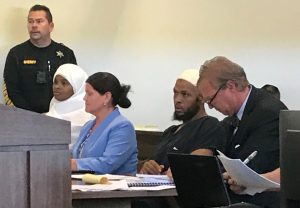
By Andrew Hay
TAOS, N.M. (Reuters) – A 3-year-old boy found buried at a New Mexico desert compound died in a ritual to “cast out demonic spirits,” but his extended family believed he would “return as Jesus” to identify “corrupt” targets for them to attack, prosecutors said in court on Monday.
Prosecutors’ account of an exorcism-like ritual, allegations of weapons training for children and references to martyrdom and conspiracy were aimed at persuading a judge to deny bond for the five adults charged with child abuse in the case.

Defense attorney Thomas Clark (R) sits next to his client, defendant Siraj Ibn Wahhaj, defense attorney Marie Legrand Miller (2nd L) and her client Hujrah Wahhaj (L) during a hearing on charges of child abuse in which they were granted bail in Taos County, New Mexico, U.S. August 12, 2018. REUTERS/Andrew Hay
However, state District Judge Sarah Backus said at the end of the four-hour detention hearing she remained unconvinced that the defendants posed a danger to the community and set bail at $20,000 for each of them.
“The state alleges that there was a big plan afoot,” Backus said in rendering her decision. “But the state hasn’t shown to my satisfaction, in clear and convincing evidence, what that plan was.”
Defense attorneys said prosecutors sought to criminalize their clients for being African-Americans of Muslim faith.
“If these people were white and Christian, nobody would bat an eye over the idea of faith healing, or praying over a body or touching a body and quoting scripture,” defense lawyer Thomas Clark told reporters after the hearing. “But when black Muslims do it, there seems to be something nefarious, something evil.”
Under terms of the judge’s order, four defendants were expected to be placed under house arrest with electronic ankle bracelets to ensure they remain within Taos County for the duration of the case.
The five suspects, who had established a communal living arrangement with their children in the high-desert compound, have been in custody since authorities raided their ramshackle homestead north of Taos 10 days ago.
The two men and three women are all related as siblings or by marriage. Three are the adult children of a prominent New York City Muslim cleric who is himself the biological grandfather of nine of the children involved.
The principal suspect, Siraj Ibn Wahhaj, 39, has also been charged with abducting his severely ill 3-year-old son, Abdul-Ghani Wahhaj, from the Atlanta home of the boy’s mother in December.
Clark said Ibn Wahhaj would remain in custody due to a fugitive warrant against him in Georgia stemming from the cross-country manhunt that led investigators to the New Mexico compound.
The body of a young boy believed to be his son was found in a tunnel at the site three days after the raid. No charges have been filed in connection with the death.
For now, the thrust of the government’s case remains 11 counts of felony child abuse filed against each of the defendants – Ibn Wahhaj and his wife, Jany Leveille, along with his brother-in-law and sister – Lucas Morton and Subhannah Wahhaj – and a second sister, Hujrah Wahhaj.
The 11 children, ranging from one to 15 years old and described by authorities as starving and ragged when they were found, were placed in protective custody after the Aug. 3 raid.
WEAPONS AND RITUALS
According to prosecutors’ presentation on Monday, some of the children were given weapons training to defend the compound against a possible raid by law enforcement. However, the government said there was more to it than that.
Federal Bureau of Investigation Special Agent Travis Taylor testified that the 15-year-old son of Ibn Wahhaj recounted one of the adults telling him the spirit of the dead 3-year-old would return “as Jesus” to direct the group in carrying out violent attacks. Taylor said prospective targets would include “the financial system, law enforcement, the education system.”
Prosecutor John Lovelace said the 3-year-old boy died during “a religious ritual” intended to “cast out demonic spirits.”
Abdul-Ghani stopped breathing, lost consciousness and died during a ceremony in which his father put his hand on the boy’s head and recited verses from the Koran, Taylor testified, citing interviews with Ibn Wahhaj’s 15-year-old and 13-year-old sons.
Prosecutors said in court documents last week that all five defendants were giving firearms instruction to the children “in furtherance of a conspiracy to commit school shootings.”
Authorities acknowledged in court on Monday that police had previously encountered Ibn Wahhaj, Leveille and seven of the children in December when they were involved in a traffic accident in Alabama.
Lovelace said police at the time found weapons and ammunition in the vehicle. Authorities let the group go after Ibn Wahhaj explained he was licensed to carry the guns as a private security agent and that he and the others were en route to New Mexico for a camping trip.
(Reporting by Andrew Hay in Taos; Writing by Steve Gorman, Alex Dobuzinskis; Editing by Tom Brown, Michael Perry and Paul Tait)



